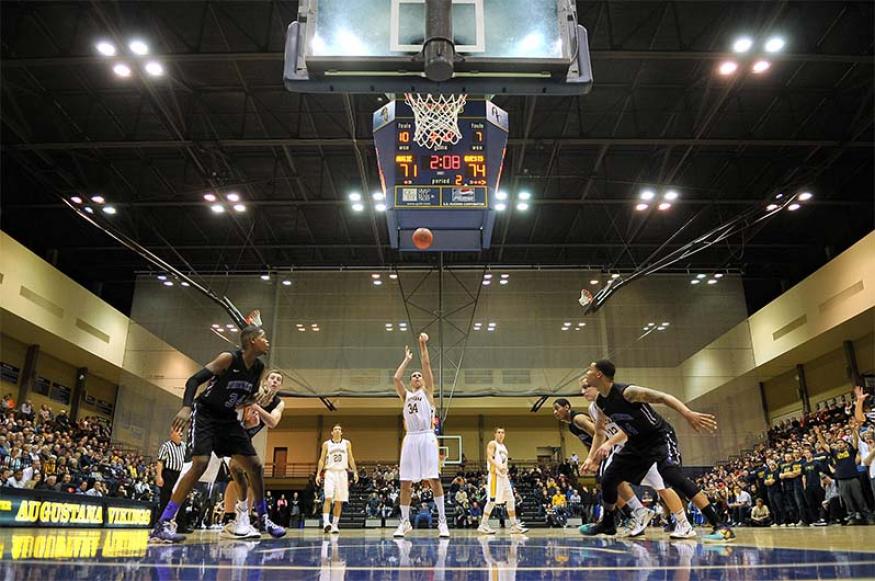
In the front row as a faculty mentor
By Jared Schroeder
Few people at Augustana can boast that they've beaten All-American guard Hunter Hill at "Horse."
My 9-year-old Tucker can.
It's possible that Hunter held back a little during their best-two-out-of-three "Horse" showdown before one of the team's practices last fall, but that doesn't stop my son from bragging a bit.
As we walked out of the gym that day, he said, "I can't beat Hunter, but I bet I can beat everyone else on the team."
After watching the Augustana men's basketball players make last-second shots, just when they needed them, again and again, all the way to the national title game, he might have a different opinion.
The real takeaway, however, isn't a simple game of "Horse." When I signed up to be the faculty mentor for the men's basketball team, I thought I was merely volunteering to provide a bridge between the academic and the athletics-oriented learning for Augustana's student athletes.
That turned out to be only one aspect of the role. From the moment I met with men's basketball head coach Grey Giovanine about my partnering with the team as its faculty mentor, he has emphasized that my family is welcome to join the team. He understands the faculty mentoring role as being more than a college professor talking to players about their studies, grades or goals. It is about having my family be part of the team.
Grey invited my sons Tucker, Oliver (7), and Sam (5), my wife, Laura, and me to have lunch with the team at the beginning of the school year. He had one of the players, Jake Norcia, whom I had in class the year before, introduce us to the rest of the team.
From that point on, we have been part of the team. The players know my sons' names and high-five them on their way on and off the court during games. Grey asks about my family when we talk.
As for my role with the team, it's been my goal to be present and available to help, but never in the way.
My sons and I attended a preseason practice, but I soon realized that while the team was very welcoming and friendly, the players had important work to do and that we didn't want to get in the way of that.
Ultimately, I shifted my work with the team to meeting players when they weren't practicing. My sons and I went to several volleyball matches last fall. We went to support my students who play on the volleyball team, but we also went because most of the men's basketball team was there, too. We could sit and talk during the volleyball matches, which worked out well. Otherwise, I see players in class or around campus.
Grey and I meet or email occasionally. I am listed as an adviser to each of the players on the team, so I am aware when a player is struggling academically and I make myself available for meetings with them.
My family and I traveled to Peoria to watch the team defeat Division I Bradley in a preseason exhibition and missed only one home game during the season. Game in and game out, we sat in the same spot in Carver, right near the front row, where the team comes on to the court.
When I was talking with some of the players after the season ended, I told them that I hoped that when they reviewed the big moments from their amazing season, such as the double-overtime win over University of Wisconsin-Whitewater, the conference-championship-winning game over Illinois Wesleyan University, or the national-tournament-win over Marietta College that propelled them to the Final Four, that they would see that I was always there in the background, supporting them.
So far, to me, that's what it means to be a faculty mentor. I'm present and available to help, but never in the way.
Jared Schroeder is an assistant professor in communication studies at Augustana.
